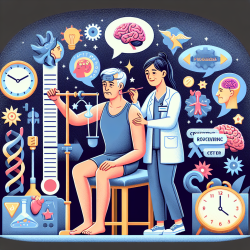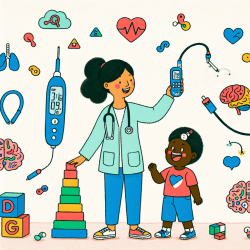Introduction
As a Special Education Director, I am constantly inspired by the transformative power of research in enhancing educational practices. The recent study titled "Fidelity protocol for the Action Success Knowledge (ASK) trial: a psychosocial intervention administered by speech and language therapists to prevent depression in people with post-stroke aphasia" is a testament to this power. This research offers invaluable insights into improving the skills of speech-language therapists by emphasizing the importance of treatment fidelity in interventions aimed at preventing depression in individuals with post-stroke aphasia.
The Importance of Treatment Fidelity
Treatment fidelity is a cornerstone of effective intervention, ensuring that therapies are delivered as intended and that their outcomes can be reliably assessed. The ASK trial underscores the significance of fidelity in psychosocial interventions, particularly for individuals with aphasia, a condition that complicates communication and can lead to depression.
The study highlights that fidelity strategies have been inconsistently applied in health behavior intervention studies, especially in aphasia interventions. By developing a robust fidelity protocol, the ASK trial aims to enhance the reliability and validity of its findings, thereby providing a model for future research and practice.
Key Takeaways for Practitioners
For practitioners looking to improve their skills, the ASK trial offers several actionable insights:
- Adopt a Structured Fidelity Protocol: Implementing a fidelity protocol based on the National Institutes of Health Behaviour Change Consortium framework can ensure that interventions are delivered consistently and effectively.
- Focus on Training and Competency: The study emphasizes the need for standardized training for therapy providers to ensure they possess the necessary skills and competencies to deliver interventions as intended.
- Monitor and Enhance Treatment Delivery: Regular monitoring through audio-video recordings and feedback can help maintain high standards of treatment delivery and identify areas for improvement.
- Engage Participants Effectively: The use of aphasia-friendly materials and personalized goal-setting can enhance participants' understanding and engagement, leading to better outcomes.
Encouraging Further Research
The ASK trial serves as a call to action for further research in the field of aphasia treatment. By exploring and implementing fidelity protocols, researchers can contribute to a deeper understanding of how to effectively support individuals with aphasia and prevent associated depression.
Practitioners are encouraged to not only apply the findings of the ASK trial but also to engage in their own research initiatives. By doing so, they can contribute to the growing body of knowledge that informs and enhances therapeutic practices.
Conclusion
The ASK trial is a beacon of inspiration for speech-language therapists and researchers alike. By emphasizing the importance of treatment fidelity, it provides a roadmap for delivering high-quality interventions that can significantly improve the lives of individuals with post-stroke aphasia. As we continue to learn and grow in our practices, let us remain committed to the principles of fidelity and the pursuit of excellence in therapy.
To read the original research paper, please follow this link: Fidelity protocol for the Action Success Knowledge (ASK) trial: a psychosocial intervention administered by speech and language therapists to prevent depression in people with post-stroke aphasia.










